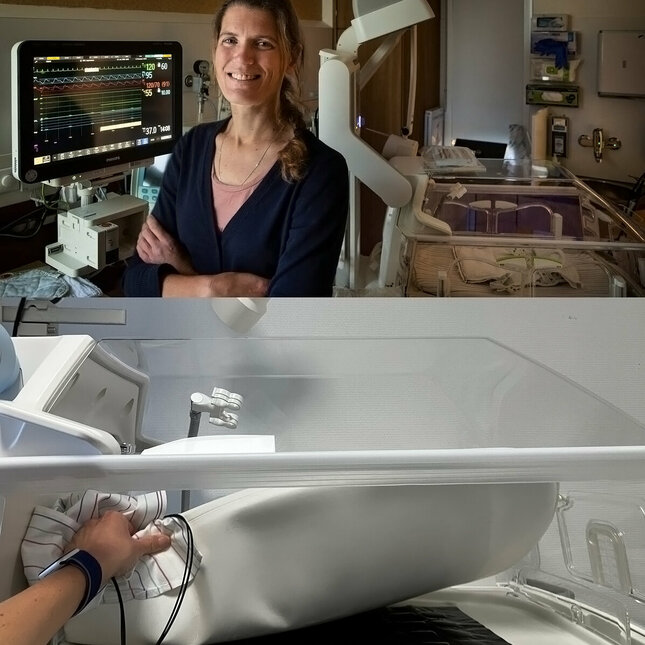
* Source: ED - Vanda van der Kooi
Clinical physicist Carola van Pul has been appointed professor at TU/e. One of her areas of interest is technology for premature babies
Maxima MC is working on a 'smart mattress ' that will soon know when the baby moves too little and is ill
VELDHOVEN - The Maxima MC is investigating whether a special mat in the incubator that monitors movement leads to better care. This may make it possible to discover earlier whether a premature baby has been affected by a serious infection. The rapid administration of antibiotics is then of vital importance.
"Thanks for taking good care of us, we can go home today." With a broad smile, a father hands over a box of Merci chocolates to NICU nurses at Veldhoven Hospital. Such a good outcome is preceded by a lot of intensive care in the neonatal intensive care unit (NICU).
Some babies are born at 24 weeks, weigh only 500 grams and have severely underdeveloped organs. Seriously ill babies are also cared for here. The MMC offers families with their own family rooms the space to give love and warmth to their baby. Modern technology in the incubator supports the baby with optimal oxygen supply and monitors heart rate and breathing.
Improvement
Movement, that is not yet measured. Clinical physicist Carola van Pul of the MMC thinks there is room for improvement here. Van Pul can further deepen her research in the coming years. She has been given this opportunity because she has been appointed professor at TU/e, at both the Faculty of Physics and Electrical Engineering, in the Biomedical Diagnostics Lab.
“If a baby is sick, it will move less, the child will save its energy. Parents and nurses notice this, sometimes subconsciously. They get a 'gut feeling' and are more alert. Is supplemental oxygen or medication required? As a clinical physicist at the MMC, I try to translate that 'gut feeling' into new technology. That is how we arrived at the sensor pad.”
Fear of sudden infant death syndrome
Similar mats are already on the market. Parents can buy one for the crib. Some people do this out of fear of sudden infant death syndrome, although this has not been proven to help. There are also nursing homes where bed sensors warn if an elderly person starts wandering at night.
The device that Van Pul wants to help develop must be sensitive enough for extremely small and weak children, and provide data that other children can also benefit from. The prototype invented at TU/e, a seemingly simple black mat, has already been tested in twenty children in the NICU. She shows the information this produces on her computer screen; a field of cubes that quickly changes colour in response to every minute movement.
A wealth of information
That data is a wealth of information. “We want to investigate whether we can recognize patterns in this. And ultimately we want to arrive at a model that recognizes patterns in future babies and, if necessary, warns if things are not going well.”
Early detection of a child's decline can be vital. She cites sepsis as an example, in which the body reacts very violently to an infection. “That is a life-threatening condition for which there is a good medicine: antibiotics. If you detect it in time and administer it immediately, you can save lives.”
The Sensor Pad also registers the rise and fall of a baby's chest. “Our research may show that we can also monitor breathing in this way from now on. Now we still have to stick a sensor on a baby to measure breathing, while that can damage their delicate skin.”
This research is one of the projects within the e/MTIC partnership. With this, Maxima MC, TU/e, Kempenhaeghe Sleep and Epilepsy center, Catharina Hospital and Philips Eindhoven want to achieve that innovative technology is applied earlier in the hospital.